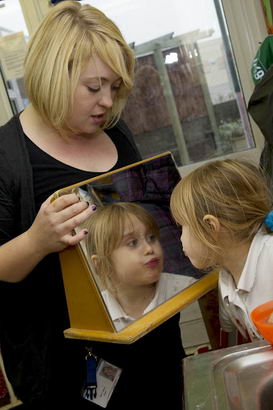
Within the 2014 special educational needs/disability framework, there is a whole-system orientation around aspirations and outcomes, including:
Ofsted will expect to see evidence of pupil progress, a focus on outcomes and a rigorous approach to the monitoring and evaluation of any 'SEN support' provided (0-25 SEND Code of Practice, 2015 (CoP), section 6.72).
Return
(See CoP, Chapter 3, section 8.3.)
- Integrated agency/service provision: Informed by
expert knowledge, local education, health and social care services should work together
to ensure children/young people with special educational needs/disabilities get the
right support to achieve their ambitions and the best possible educational and other
outcomes, including getting a job and living as independently as possible (CoP, section
1.22).
- 'Partners must agree how they will work
together. They should aim to provide personalised, integrated support that delivers
positive outcomes…from early childhood through to adult life, and improves planning
for transition points...'
(CoP, section 1.25)
- 'Partners must agree how they will work
together. They should aim to provide personalised, integrated support that delivers
positive outcomes…from early childhood through to adult life, and improves planning
for transition points...'
- More appropriate local services - partners should develop a joint understanding of the outcomes that their local population with special educational needs/disabilities aspires to, and use it to produce a joint plan, which is delivered and reviews jointly; and
- Useful insights into how to improve services and
outcomes - partners must engage children/young people with special educational
needs/disabilities and children's parents in commissioning decisions and must
develop effective ways of harnessing the views of their local communities so that
users' experiences, ambitions and expectations shape commissioning decisions.
(CoP, section 3.18)
Return
To identify and address the special educational needs/disabilities of the pupils they support (all education providers), through using 'their best endeavours to make sure that a child with special educational needs gets the support they need – this means doing everything they can to meet children's/young people's special educational needs' (maintained schools, academies and alternative provisions) (CoP, section 6.2).
Early years providers, schools and colleges should know precisely where children/young people with SEN are in their learning and development. They should:
- Ensure decisions are informed by the insights of parents and those of children/young people themselves
- Have high ambitions and set stretching targets for them
- Track their progress towards these goals
- Keep under review the additional or different provision that is made for them
- Promote positive outcomes in the wider areas of personal and social development, and
- Ensure that the approaches used are based on the best possible evidence and are having the required impact on progress.'
(CoP, section 1.25)
'In practical situations in everyday settings, the best early years settings,
schools and colleges do what is necessary to enable children and young people to develop,
learn, participate and achieve the best possible outcomes irrespective of whether
that is through reasonable adjustments for a disabled child or young person or special
educational provision for a child or young person with SEN.'
(CoP, section 1.34)
Return
Assessment for and delivery of 'SEN support' and Education, Health and Care Plans
start by 'focusing on outcomes that are important to the individual.'
(CoP, section 3.20)
'Consideration of whether special educational provision is required should start
with the desired outcomes, including the expected progress and attainment and the
views and wishes of the pupil and their parents. This should then help determine the
support that is needed and whether it can be provided by adapting the school's core
offer or whether something different or additional is required.'
(CoP, section 6.40)
Return

Outcomes can benefit an individual as a result of an intervention at three levels:
- Individual outcomes (eg listed in an individual’s EHC Plan);
- Service level outcomes (eg outcomes for groups of local service users);
- Strategic outcomes (eg local authority/national outcomes that can impact on policy).
(0-25 SEND Code of Practice, 2015 (CoP), section 3.31)
'Partners should use their joint understanding to determine the shared outcomes
they seek to achieve, drawing on national and local priorities. The local community
should be aware both of what the shared outcomes are and the plan to achieve them
(eg through the Local Offer).'
(CoP, section 3.33)
Strategies and provision should be reviewed at all levels with partners and service-users, and where necessary realigned, to ensure they enable children/young people with special educational needs/disabilities to achieve their desired outcomes.
'Local authorities must place children, young people and families at the centre of their planning, and work with them to develop co-ordinated approaches to securing better outcomes, as should clinical commissioning groups (CCGs).
They should develop a shared vision and strategy which focuses on aspirations and outcomes, using information from EHC Plans and other planning to anticipate the needs of children/young people with special educational needs and ensure there are pathways into employment, independent living, participation in society and good health.
Where pathways need further development, local authorities and CCGs should set out clear responsibilities, timescales and funding arrangements for that work.
This strategic planning will contribute to their:
- Joint commissioning
- Local offer, which must include support in preparing for adulthood (see paragraphs 4.52 to 4.56 in Chapter 4)
- Preparation of EHC Plans and support for children and young people to achieve the outcomes in their plan.'
(0-25 SEND Code of Practice, 2015, section 8.1)
The local authority and service provider facilitation for children/young people with special educational needs/disabilities and their parents may take the following forms:
- Confidential and impartial information, advice and support (eg through the local authority’s Information, Advice and Support Service);
- Support in exercising choice and control;
- Full participation in decisions about their desired outcomes;
- Partnership working with young people;
- Personal control (eg Personal Budgets);
- Young person’s voice;
- Advocacy support (eg for meetings, assessments, reviews, etc);
- Support to access additional public and voluntary sector services;
- Personal Budgets/Direct Payments where possible;
- Help when things go wrong (eg disagreement resolution, mediation, appeals to the First Tier Tribunal);
- Empowerment through parent carer support groups, local special educational needs youth forums or disability groups, or training events.
(0-25 SEND Code of Practice 2015, sections 2.15, 2.19; Care Act 2014, section 67)
High aspirations are crucial to success.
Discussions about longer term goals should start early and ideally well before Year 9 (age 13-14) at school.
They should focus on the child's or young person’s strengths and capabilities and the outcomes they want to achieve.
To enable this:
- Agencies and services should plan strategically for the support children/young people will need to prepare for adult life;
- Early years providers, schools and colleges should enable children/young people to have the information and skills they need to help them gain independence and prepare for adult life;
- Agencies, services and professionals can support children/young people and their families to plan to meet aspirations for the next stage of transition, especially post-16/post-18;
- Post-16 institutions can design study programmes, pathways to employment;
- Young people should be supported to make decisions for themselves;
- Local authorities and Health Services should plan suitable packages of provision for children/young people with EHC Plans.
(0-25 SEND Code of Practice, 2015, Chapter 8)
These quotes taken from Chapter 7 of the 0-25 SEND Code of Practice (2015) include representative principles which are also applicable to early years and other education providers:
'All students aged 16-19 (and students up to the age of 25 where they have an EHC Plan) should follow a coherent study programme which provides stretch and progression and enables them to achieve the best possible outcomes in adult life.'
'The effectiveness of the [SEN] support and its impact on the student's progress should be reviewed regularly, taking into account the student's progress and any changes to the student's own ambitions and aspirations, which may lead to changes in the type and level of their support.'
'The college and the student together should plan any changes in support. Colleges should revisit this cycle of action, refining and revising their decisions about support as they gain a richer understanding of the student, and what is most effective in helping them secure good outcomes. Support for all students with SEN should be kept under review, whether or not a student has an EHC Plan.'
(0-25 SEND Code of Practice, 2015, sections 7.6, 7.19)
'All children and young people are entitled to an appropriate education, one that is appropriate to their needs, promotes high standards and the fulfilment of potential. This should enable them to:
- 'Achieve their best;
- 'Become confident individuals living fulfilling lives; and
- 'Make a successful transition into adulthood, whether into employment, further or higher education or training.'
(0-25 SEND Code of Practice, 2015 (CoP),
section 6.1)
All pupils should be enabled to make and maintain progress. However severe a pupil's difficulties, using the 'graduated approach' (CoP, sections 5.38, 6.44, 7.14) teachers can identify and trial evidence-based strategies and approaches linked to broad areas of need (CoP, sections 6.28-6.35).
The emphasis is upon enabling a pupil's progress towards what could be called '3-D' outcomes (short, medium and long term dimensions) by removing learning barriers and building learning bridges through 'SEN support' from the earliest years.
Reflect on this as you read Chapter 8 of the 0-25 SEND Code of Practice (2015).

Consider the Council for Disabled Children's outcomes pyramid (2014).
Taking the idea of '3-D outcomes', consider the Education, Health and Care Plan outcomes relating to a child whom you work with. How could you increase the dimensionality of these outcomes? What implications could they have across the curriculum? How might the wording of the outcomes be tweaked to make them more creative in terms of the child's/young person's mid-term and long term aspirations?
Dip into Leading for Outcomes: Children and young people (Institute for Research and Innovation in Social Services, 2012).

Legislation and guidance
- Children and Families Act 2014
- The Special Educational Needs and Disability
Regulations 2014 - Special Educational Needs (Personal Budgets and Direct Payments) 2014
- Special Educational Needs and Disability Code of Practice: 0-25 years (Department for Education, 2015)
Other publications
- Institute for Research and Innovation in Social Services (2012) Leading for Outcomes: Children and young people. Glasgow: IRISS